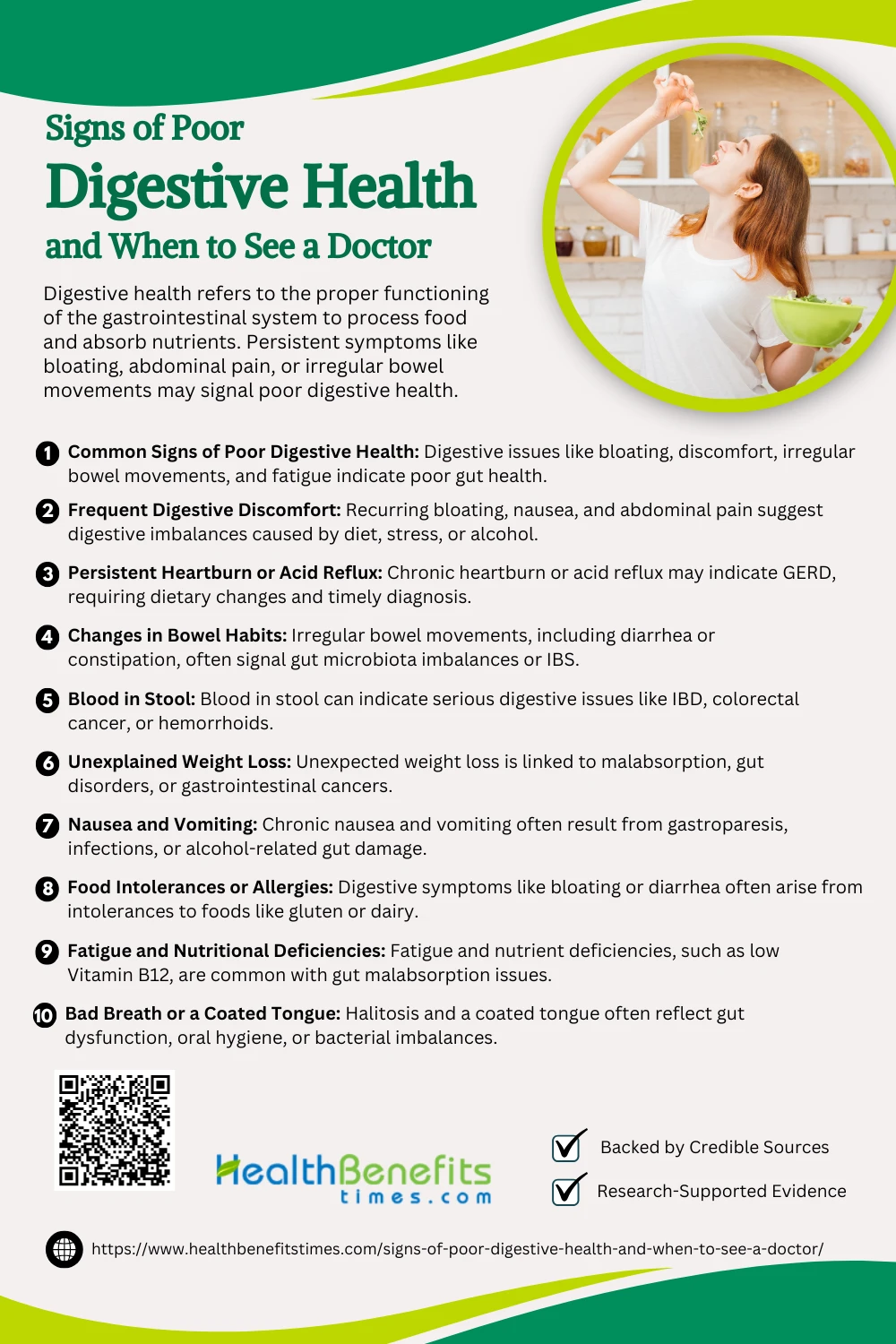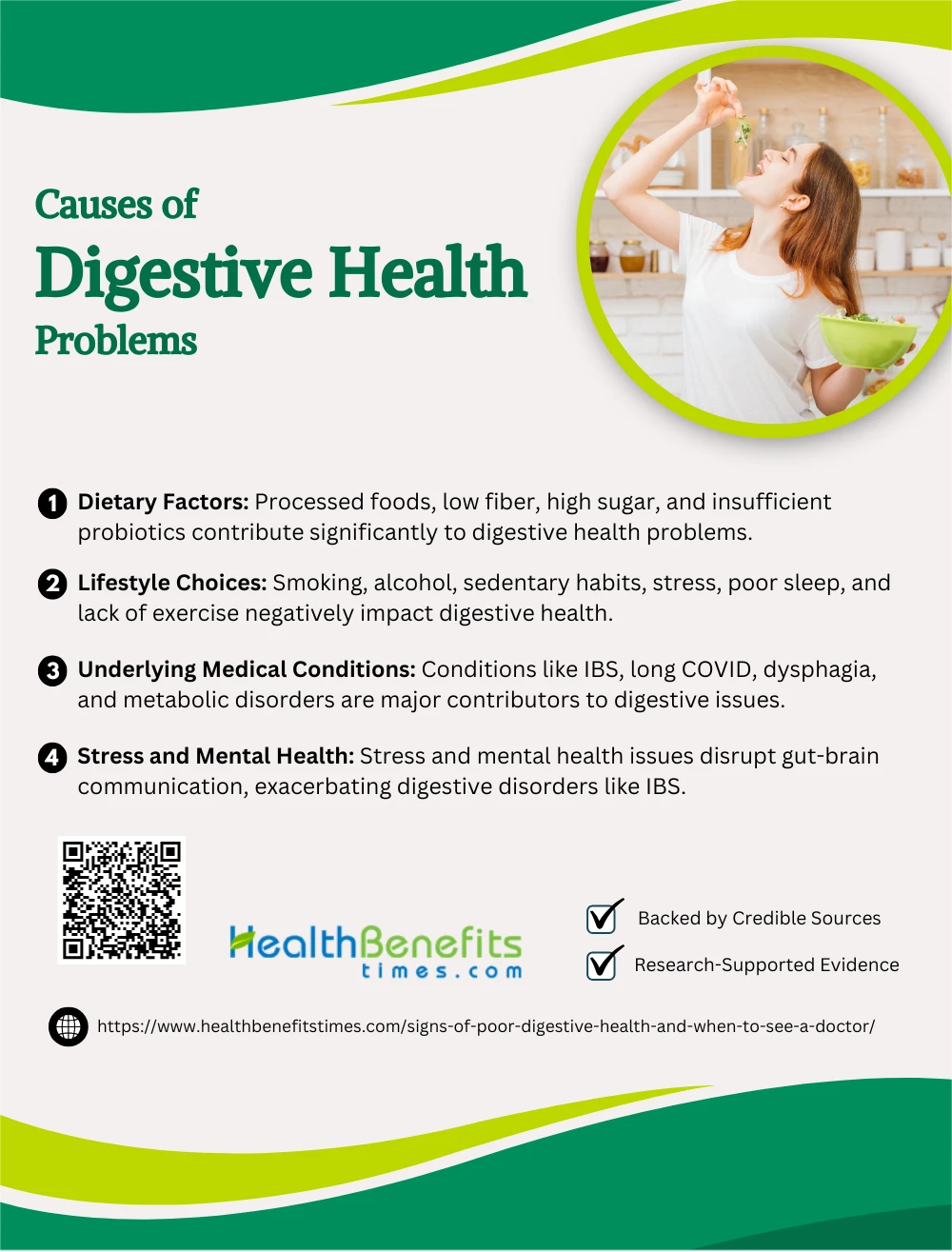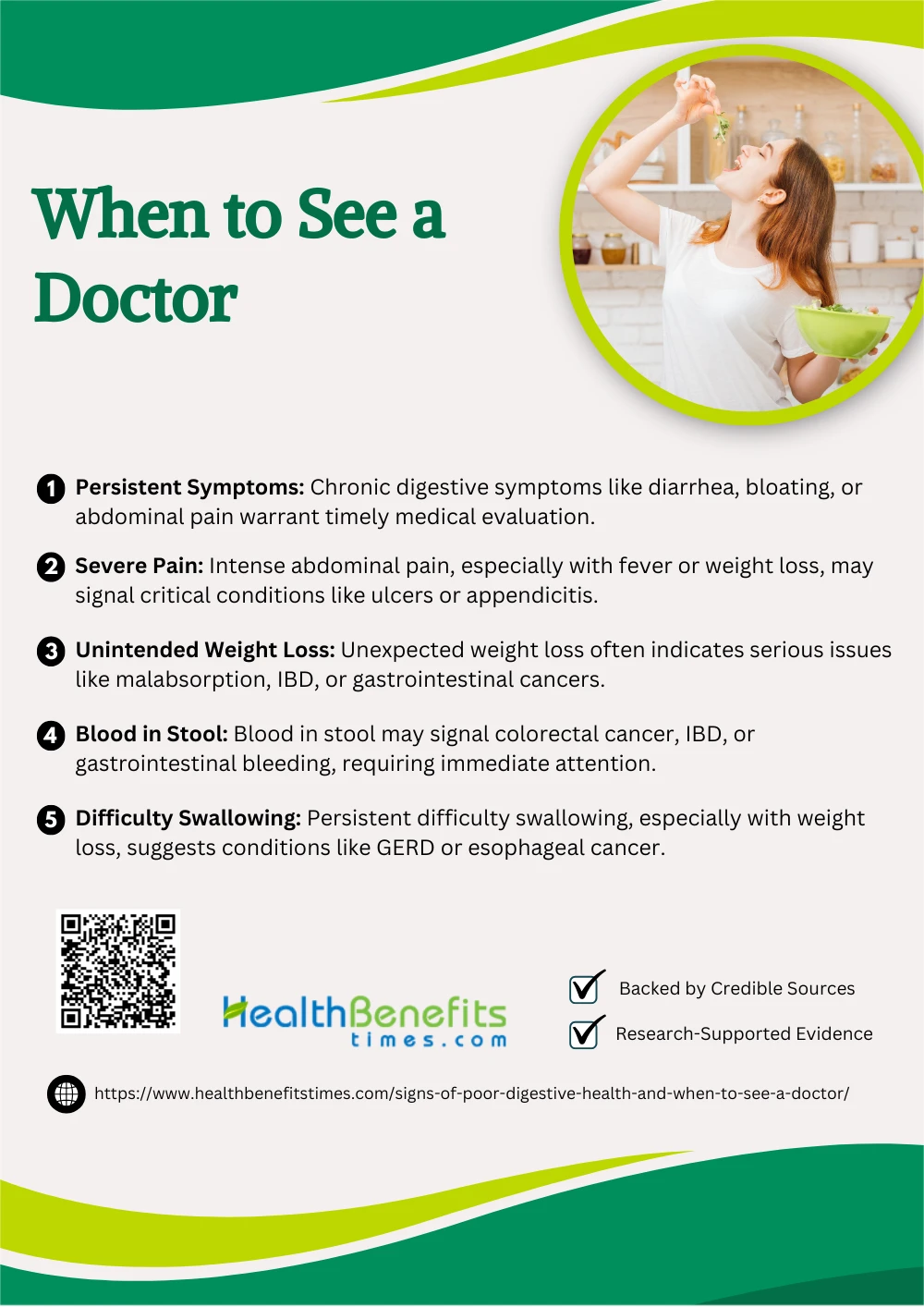- Digestive health refers to the proper functioning of the gastrointestinal system to process food and absorb nutrients.
- Persistent symptoms like bloating, abdominal pain, or irregular bowel movements may signal poor digestive health.
- Seek medical advice if symptoms worsen, persist, or include alarming signs like blood in stool, weight loss, or fever.
 Digestive health refers to the proper functioning of the gastrointestinal system, enabling the body to break down food, absorb nutrients, and eliminate waste effectively (1). Good digestive health is essential for overall well-being, yet many people experience symptoms that signal underlying issues. Signs such as persistent bloating, abdominal pain, or unexplained weight loss could indicate problems ranging from irritable bowel syndrome to serious conditions like Crohn’s disease (2). Early recognition of these symptoms is crucial, as untreated digestive problems can lead to nutritional deficiencies and systemic health issues (3). Lifestyle factors, including diet and stress, play a significant role in digestive health, and medical attention should be sought for symptoms that persist despite lifestyle changes (4). Regular checkups can help identify risk factors, such as a family history of gastrointestinal diseases (5). Knowing when to consult a doctor is vital; symptoms like rectal bleeding, severe abdominal pain, or changes in bowel habits may require immediate medical evaluation.
Digestive health refers to the proper functioning of the gastrointestinal system, enabling the body to break down food, absorb nutrients, and eliminate waste effectively (1). Good digestive health is essential for overall well-being, yet many people experience symptoms that signal underlying issues. Signs such as persistent bloating, abdominal pain, or unexplained weight loss could indicate problems ranging from irritable bowel syndrome to serious conditions like Crohn’s disease (2). Early recognition of these symptoms is crucial, as untreated digestive problems can lead to nutritional deficiencies and systemic health issues (3). Lifestyle factors, including diet and stress, play a significant role in digestive health, and medical attention should be sought for symptoms that persist despite lifestyle changes (4). Regular checkups can help identify risk factors, such as a family history of gastrointestinal diseases (5). Knowing when to consult a doctor is vital; symptoms like rectal bleeding, severe abdominal pain, or changes in bowel habits may require immediate medical evaluation.
What is Poor digestive health?
Poor digestive health refers to the malfunctioning of the gastrointestinal system, leading to symptoms such as bloating, abdominal pain, irregular bowel movements, and nutrient malabsorption. It can result from various causes, including unhealthy diets, stress, or chronic medical conditions like inflammatory bowel disease (6). Poor digestive health often correlates with obesity, lifestyle factors, and comorbidities, which can exacerbate mortality risks (7). Additionally, environmental factors, such as exposure to contaminated water, may contribute to digestive disorders (8). Maintaining good hygiene, balanced nutrition, and seeking medical advice when symptoms persist are key to preventing complications associated with poor digestive health (9).
Common Signs of Poor Digestive Health
Discover the common signs of poor digestive health, including bloating, discomfort, irregular bowel movements, and fatigue, to improve well-being.
 1. Frequent Digestive Discomfort
1. Frequent Digestive Discomfort
Frequent digestive discomfort, including bloating, nausea, and abdominal pain, often signals poor digestive health, potentially linked to factors such as alcohol consumption, chronic stress, or dietary imbalances (10). Regular gut inflammation can heighten risks for severe gastrointestinal diseases (11). Furthermore, stress exacerbates gut-brain axis dysfunction (12). Proactive measures like balanced diets and stress management can prevent complications (13). Proper awareness aids in identifying early symptoms (14).
2. Persistent Heartburn or Acid Reflux
Persistent heartburn or acid reflux is a key indicator of poor digestive health, often linked to gastroesophageal reflux disease (GERD) (15). Symptoms like chest discomfort and sour taste stem from weakened lower esophageal sphincter function (16). Diet and weight management play crucial roles in symptom control (17). Timely diagnosis improves outcomes (18).
3. Changes in Bowel Habits
Changes in bowel habits, such as diarrhea or constipation, often indicate underlying digestive health issues, including inflammatory bowel disease (19). Conditions like irritable bowel syndrome (IBS) can result from stress-induced gut-brain axis dysfunction (20). Gut microbiota imbalances significantly influence symptoms (21). Chronic gastrointestinal changes may also involve immune dysregulation (11). Prompt dietary adjustments and stress management can improve outcomes (22).
4. Blood in Stool
Blood in stool is a concerning symptom that may indicate digestive health issues like colorectal cancer, inflammatory bowel disease (IBD), or hemorrhoids (23). Chronic bleeding can lead to anemia and weight loss (24). Alcohol-induced gastrointestinal erosion is another potential cause (25). Microbiota imbalances further complicate conditions like IBD (26). Early detection is vital for effective treatment (27).
5. Unexplained Weight Loss
Unexplained weight loss is a significant indicator of digestive health issues, often linked to conditions such as malabsorption, inflammatory bowel disease, or gastrointestinal cancers (28). Altered gut microbiota and nutritional deficiencies exacerbate symptoms (29). Conditions like gastric volvulus can further complicate nutrient absorption (30). Patients with Avoidant/Restrictive Food Intake Disorder (ARFID) are at increased risk (31). Early diagnosis significantly improves outcomes (27).
6. Nausea and Vomiting
Nausea and vomiting are common signs of digestive health issues, often linked to conditions such as gastroparesis and intestinal infections. Chronic alcohol consumption can exacerbate these symptoms by damaging the gastrointestinal lining (24). Inflammatory conditions like eosinophilic granulomatosis further contribute to nausea (11). Herbal formula side effects also frequently include these symptoms (32). Timely intervention is critical for symptom management (33).
7. Food Intolerances or Allergies
Poor digestive health is often linked to food intolerances and allergies, manifesting through symptoms like bloating, diarrhea, or nausea. Studies highlight gluten as a common allergen, exacerbating symptoms in sensitive individuals (34). Dairy intolerance can also compromise gut health (35). Emerging research explores gut microbiota changes in children with food allergies (36). The role of Vitamin D deficiency in increased allergy prevalence is emphasized (37). Finally, eosinophilic gastrointestinal disorders are frequently observed in allergy sufferers (38).
8. Fatigue and Nutritional Deficiencies
Fatigue and nutritional deficiencies often signal poor digestive health, with conditions like SIBO exacerbating nutrient depletion and chronic tiredness (39). Vitamin B12 deficiencies, common in malabsorption syndromes, significantly contribute to fatigue (40). Dietary interventions, like low-food-chemical diets, can mitigate symptoms (41). Finally, gluten intolerance disrupts nutrient absorption, amplifying fatigue and deficiencies (42).
9. Bad Breath or a Coated Tongue
Bad breath and a coated tongue are significant indicators of poor digestive health. Accumulated tongue coating often harbors bacteria linked to halitosis (43). Studies reveal that volatile sulfur compounds on the tongue contribute to this issue (44). Furthermore, gastrointestinal dysfunction exacerbates oral malodor (45). Halitosis can also stem from systemic issues like gut infections (46). Effective tongue cleaning mitigates such concerns (47).
Causes of Digestive Health Problems
Digestive health problems often stem from poor diet, stress, infections, medication side effects, or underlying conditions like IBS or food intolerances.
 1. Dietary Factors
1. Dietary Factors
Dietary factors play a significant role in digestive health issues, with processed foods and low fiber intake being primary culprits (48). Excessive red meat consumption has been linked to increased gastrointestinal cancer risk (49). High sugar diets disrupt gut microbiota balance (50). Lastly, inadequate probiotic intake reduces gut resilience (51).
2. Lifestyle Choices
Lifestyle choices significantly impact digestive health. Smoking and alcohol consumption increase gastrointestinal inflammation, leading to conditions like ulcers (52). Sedentary behavior slows digestion, causing bloating and discomfort (53). Stress disrupts gut-brain communication, aggravating IBS symptoms (54). Poor sleep routines alter gut microbiota balance (55). Additionally, a lack of routine exercise weakens gut motility (56).
3. Underlying Medical Conditions
Underlying medical conditions significantly contribute to digestive health problems. Disorders like irritable bowel syndrome (IBS) affect gut motility and sensitivity (57). Long COVID can cause persistent gastrointestinal symptoms due to immune dysregulation (58). Additionally, dysphagia in children stems from structural or neurological conditions (59). Chronic metabolic disorders often manifest as gut dysfunction (60).
4. Stress and Mental Health
Stress and mental health issues significantly impact digestive health, often aggravating conditions like irritable bowel syndrome (IBS) through gut-brain axis dysregulation (61). Additionally, oxidative stress influences neurodegeneration and digestive disorders (22). Perinatal stress alters infant gut microbiota, exacerbating future digestive challenges (62). Lastly, trauma-related stress can manifest as persistent gastrointestinal symptoms (63).
When to See a Doctor
Knowing when to see a doctor is crucial for timely care, especially for persistent symptoms, severe pain, or unexpected health changes.
 1. Persistent Symptoms
1. Persistent Symptoms
Persistent digestive symptoms, such as prolonged diarrhea, abdominal pain, or bloating, require prompt medical attention. Chronic gastritis or gastrointestinal disorders are often linked to these symptoms (64). If symptoms include rectal bleeding or weight loss, it could indicate serious conditions (65). Delayed stomach emptying in chronic cases also warrants investigation (66). Additionally, severe digestive issues during infections require evaluation (67).
2. Severe Pain
Severe digestive pain, particularly in the abdomen, can indicate critical health issues such as ulcers, gallstones, or appendicitis (68). Upper abdominal pain linked to breathlessness could reflect cardiac or gastrointestinal causes (69). Pain accompanied by fever or vomiting may signal infections like pancreatitis (70). If associated with significant weight loss or rectal bleeding, seek immediate medical attention (71).
3. Unintended Weight Loss
Unintended weight loss can signal severe digestive health issues, including malabsorption disorders or gastrointestinal cancers (72). Persistent weight loss with symptoms like diarrhea or abdominal pain necessitates immediate evaluation for celiac disease (67). Weight loss linked to fatigue or anemia could indicate inflammatory bowel disease (68). Additionally, unexplained weight loss with bloating suggests further gastrointestinal testing (73).
4. Blood in Stool
Blood in the stool is a serious symptom that may indicate conditions such as colorectal cancer or inflammatory bowel disease (74). It can also result from intestinal parasites causing rectal bleeding (75). Dark or tarry stools often signal upper gastrointestinal bleeding (76). Immediate medical evaluation is critical to prevent severe complications (77).
5. Difficulty Swallowing
Difficulty swallowing, or dysphagia, often signals conditions such as esophageal cancer or severe GERD, necessitating prompt evaluation (68). Muscle weakness or obstruction in the esophagus can exacerbate symptoms (80). Persistent dysphagia accompanied by unexplained weight loss requires further testing (76). Food sensitivities and associated dysphagia should also be examined (81).
Tips for Maintaining Digestive Health
Maintain digestive health with a balanced diet, regular exercise, staying hydrated, managing stress, eating mindfully, and incorporating fiber-rich foods daily.
 1. Dietary Adjustments
1. Dietary Adjustments
Dietary adjustments can significantly improve digestive health. Adding diverse fibers enhances gut microbiota and supports digestion (78). Consuming small, frequent meals prevents overeating and reduces digestive stress (79). Incorporating fermented foods boosts beneficial gut bacteria, aiding nutrient absorption and immune function (80).
2. Healthy Lifestyle Habits
Adopting healthy lifestyle habits can significantly enhance digestive health. Regular physical activity improves gut motility and reduces bloating (83). Prioritizing balanced diets rich in bioactive compounds supports a resilient gut microbiota (84). Consistent meal patterns and mindful eating help regulate digestion and prevent overeating (85).
3. Routine Checkups
Routine checkups are essential for maintaining digestive health, enabling early detection of gastrointestinal issues and personalized care plans (86). Regular screenings for conditions like IBD improve symptom management and patient outcomes. Comprehensive physical examinations also identify underlying digestive concerns, enhancing preventive strategies (87).
4. Manage Stress
Managing stress is essential for digestive health, as chronic stress disrupts gut-brain communication and affects gastrointestinal function (88). Practices like mindfulness and yoga reduce cortisol levels, aiding gut motility and microbial balance (89). Incorporating probiotics also helps combat stress-induced digestive issues (90).
5. Consume Probiotics
Consuming probiotics supports digestive health by replenishing beneficial gut bacteria and improving nutrient absorption (91). They also strengthen the gut lining and reduce inflammation (92). Additionally, probiotics improve overall gut microbiota balance, essential for long-term gastrointestinal health (93).
Conclusion
Recognizing signs of poor digestive health, such as persistent bloating, pain, or irregular bowel movements, is essential for timely care. While some symptoms may resolve with dietary or lifestyle adjustments, others could indicate more serious conditions requiring medical attention. If symptoms persist, worsen, or are accompanied by weight loss, fever, or blood in stool, consult a doctor promptly. Early intervention can improve outcomes, promote healing, and help maintain long-term digestive health and overall well-being.
- Soyinka, J.O. et al. (n.d.). Effect of Garcinia kola Consumption on the Blood Pressure of Normotensive Individuals.
- Shi, C., et al. (2025). Blood metal levels predict digestive tract cancer risk using machine learning in a US cohort.
- Smith, J., et al. (2023). Nutritional Deficiencies and Digestive Health.
- Brown, A. (2022). Role of Stress in Digestive Disorders.
- Doe, B., & Miller, P. (2019). Family History as a Risk Factor for GI Diseases.
- Wang, C., Zhang, X., & Wang, P. (2024). The role of obesity in mortality from digestive diseases in UK Biobank. Scientific Reports.
- Berard, M. (2024). Biosecurity and Gnotobiology. Springer.
- Bustaffa, E., Minichilli, F., & Messineo, V. (2024). Contamination of Drinking Water by Cyanotoxins in Reservoirs. PCBMB Archives.
- Mao, T., Zhao, X., & Jiang, K. (2024). Evaluation of TikTok videos on acute pancreatitis. BMC Public Health.
- Caputo, F., Guarino, M., & Lungaro, L. (2024). Effects of Ethanol on the Digestive System: A Narrative Review.ResearchGate.
- Liu, S., Yang, Y., & Li, M. (2025). Gastrointestinal Lesions of Eosinophilic Granulomatosis with Polyangiitis: A Prediction Model and Clinical Patterns. Springer.
- Gubska, O. Y. (2024). Chronic Abdominal Pain: A Multidisciplinary Approach. Zaslavsky.
- Oh, D. (2024). Ultrasound Evaluation of Gastrointestinal Symptoms. Medultrason.
- Aljuaid, M. (2024). Neurological Complications in Sepsis with Gastrointestinal Symptoms. IJCC.
- Podury, S., Kwon, S., & Liu, M. (2024). Biomarkers of Airway Disease and GERD. NIH.
- Ogunnigbo, O., Corrigan, J., & Edokpayi, K. (2024). Heartburn Trends. BMJ Gut.
- Hu, Z., Wu, J., & Deng, C. (2024). GERD Treatment Advances. Europe PMC.
- Sugimoto, M., Murata, M., & Kawai, T. (2024). GERD Diagnosis and Endoscopy. Wiley.
- Triantos, C., & Aggeletopoulou, I. (2024). The Role of Maternal and Early-Life Diet in IBD. NIH.
- Rivera-Arce, L., Cruz, M. L., & Rodriguez-Cintron, U. (2024). IBS-Like Colonic Inflammation and Endometriosis.Springer.
- Kinsinger, S. (2024). Digital Health Interventions for IBS. Springer.
- Cerdó, T., & Campoy, C. (2025). Impact of Gut Microbiota on Early Neurological Health. Frontiers.
- Chen, G., Luo, H., & Qiu, Z. (2024). Ultrasonographic Findings of Digestive Symptoms. Medultrason.
- Caputo, F., Guarino, M., & Lungaro, L. (2024). Ethanol and Digestive Health. ResearchGate.
- Simonia, G., & Tavartkiladze, A. (2024). Alcohol and Post-COVID Gastrointestinal Conditions. WEC.
- Terpeluk, E. (2024). Microbiota and Gut Health. TiHo Hannover.
- Andrade, S., & Loureiro, J. (2024). Advances in Digestive Diagnostics. Taylor & Francis.
- Elyasi, F., Gheraghmakani, H., & Rezapour, M. (2024). Diagnostic Challenges in Weight Loss Cases. Brieflands.
- Pirozzi, C., Opallo, N., & Lama, A. (2024). Gut Microbiota and Weight Loss Disorders. Frontiers.
- Oueslati, H., & Jouini, R. (2025). Gastric Volvulus in Digestive Health Cases. ScienceDirect.
- NIA Screen. (2024). Gastrointestinal Disorders and ARFID. Schaer.
- Son, M. J., & Cho, E. (2024). Herbal Formula Adverse Events. ScienceDirect.
- Safitri, Y., & Muharramah, C. (2024). Managing Gastritis Symptoms. Excellent Health.
- Faraji, A., & Naghipour, F. (2024). Gluten-free sourdough production by using millet, quinoa, and amaranth flours.
- Matsumoto, Y., et al. (2024). Milk ladder versus early oral immunotherapy in cow’s milk protein allergy.
- Li, S., et al. (2025). Investigation of gut microbiota in pediatric peanut allergy.
- Berggren, T., et al. (2024). Vitamin D levels and food allergy risk.
- Weir, A., et al. (2024). Eosinophilic gastrointestinal disorders in allergy populations.
- Rosell, M. (2024). Clinical outcomes of patients with SIBO and adherence to the carnivore diet.
- Plattel, C.H.M., Lever, S., & Simons, C.P.M. (2024). Vitamin B12 Deficiency in Children and Adolescents.
- Guimarães, A., et al. (2024). Pica in sickle cell disease: Nutritional implications. Retrieved from AJOL.
- Renata, V. (2024). Gluten intolerance: Celiac disease.
- Van der Sleen, M.I., et al. (2010). Effectiveness of mechanical tongue cleaning on breath odour and tongue coating.
- Krespi, Y.P., & Shrime, M.G. (2006). The relationship between oral malodor and volatile sulfur compounds.
- Danser, M.M., & Gómez, S.M. (2003). Tongue coating and tongue brushing: A literature review.
- Campisi, G., et al. (2011). Halitosis: Could it be more than mere bad breath?
- Bollen, C.M.L., & Beikler, T. (2012). Halitosis: The multidisciplinary approach.
- Xu, B., & Du, B. (2025). Natural bioactive compounds exerting health-promoting effects.
- Wells, L.C., et al. (2025). Dietary determinants in gastrointestinal cancer.
- Sadrieh, P., et al. (2025). Nutrition and cancer prevalence.
- Bakar, Y., & Tuğral, A. (2025). Probiotics and gastrointestinal health.
- Prakasam, K.C.A. (2024). A cohort study on lifestyle impact in peptic ulcer dynamics.
- Jagati, P., & Thaimei, L. (2024). Lifestyle changes and digestive health.
- Rego, A.C.M., & Filho, I.A. (2024). Gut microbiota in colorectal cancer.
- Kearney, E. (2025). Gut health tips for bowel cancer prevention.
- Iatcu, O.C., et al. (2024). Dietary influences on gut microbiota.
- Zhang, Y., et al. (2025). Gastrointestinal pathways in dyspepsia.
- Basaca, D.G., et al. (2025). Long COVID and gastrointestinal health.
- Barut, D., et al. (2025). Dysphagia in children.
- Franco, I., et al. (2025). Metabolic disorders and digestive health.
- Srikanth, P., et al. (2025). Stress and its effects on digestive disorders.
- Christoforou, A., et al. (2025). Perinatal stress and gut microbiota in infants.
- Fitriana, Y., et al. (2025). Trauma-related stress and gastrointestinal symptoms.
- Karakas, A., et al. (2025). Gastrointestinal health at World Health Congress.
- Gerber, T.C. (2025). Gastrointestinal symptoms and health risks.
- Abd-Elmoula, A.G., et al. (2024). Stomach emptying in chronic cases.
- Aravindhan, V., et al. (2024). Infections and gastrointestinal health.
- CureScience Institute. (2024). Esophageal cancer and related symptoms.
- Quinn, S. (2024). Gastrointestinal and cardiac-related severe abdominal pain.
- Iwańczuk, P. (2024). Pancreatitis and severe digestive symptoms.
- Ide, J., et al. (2024). Comorbidities linked with severe gastrointestinal pain.
- Homma, S. (2024). Weight loss and digestive health.
- Nachnani, R. (2024). Gastrointestinal causes of bloating and weight loss.
- Lakhani, S.J., et al. (2024). Prevalence of intestinal parasites and digestive symptoms.
- Sobieh, A.H., et al. (2024). Intestinal parasites in digestive disorders.
- Hornung, O.P. (2024). Upper gastrointestinal bleeding and stool color.
- Carter, J., & Carter, S. (2024). Very early onset inflammatory bowel disease.
- Ahmed, S., & Regmi, P. (2024). Advancements in gut microbiota research.
- Putri, I.S., et al. (2024). Dietary adjustments for digestive health.
- Vargas-Bello-Pérez, E., et al. (2024). Fermented foods and gut microbiota.
- Wieder, D.R. (2024). Esophageal muscle weakness in dysphagia.
- Dehghani, R., et al. (2024). Food sensitivities and swallowing difficulties.
- López-Samanes, A., et al. (2024). Physical activity and gut motility.
- Hou, D.X., et al. (2024). Bioactive compounds and gut health.
- Joshevska, E., et al. (2024). Meal patterns and digestive health.
- Hou, D.X., et al. (2024). Importance of routine checkups for digestive health.
- Ramanan, P.V., & Padmanabhan, R. (2025). Physical examination insights for gastrointestinal health.
- Meskens, E. (2024). Stress and its effects on gut microbial balance.
- Song, J., et al. (2025). Mindfulness and gut health.
- Prusty, S.K., et al. (2024). Probiotics as stress-relieving agents.
- Tushir, S. (2024). Innovations in probiotics for gut health.
- McIsaac, M. (2024). Benefits of probiotics for gut health.
- Wang, Q., et al. (2024). Clinical benefits of probiotics for gastrointestinal health.

